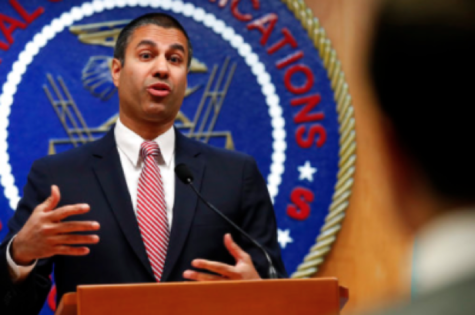Net neutrality: what you need to know
January 9, 2018
According to Save the Internet, net neutrality is the basic principle that prohibits service providers from speeding up, slowing down, or blocking any content, websites, or apps. Net neutrality allows us to communicate freely online and has been a law since the 2015 Obama era. On December 14, the Federal Communications Commission (FCC) voted 3-2 to repeal the net neutrality rules in place. According to Elle, these new rules could create big changes on how we use the internet.
According to reports from the New York Times, people should not expect to see immediate changes to their internet service. However, in the future, companies such as Verizon could begin to charge companies to deliver more material to people’s devices, or they could slow sites they do not favor.

An example from the Washington Post explains that Verizon, with net neutrality rules in place, could not favor AOL or Yahoo, which they own. With the rules repealed, Verizon could potentially block Google or charge fees to allow customers to connect.
“For most of us, I expect we will pay more. Service bundles will likely be bolted on to basic transport for things like web surfing and email,” said Glenn O’Donnell, industry analyst, to the Washington Post.
Although one can expect such changes to occur, the New York Times reports that several companies such as Comcast, Verizon, and other service providers have spoken out and said they will not block or throttle any sites. Furthermore, the companies also stated they will not begin forms of paid prioritization, to charge people for sites they wish to use.
Along with several companies announcing they will not go along with net neutrality rules, various states and organizations have chosen to speak out, and many have sued the FCC. New York attorney general Eric Schneidermen was the catalyst for the movement. Now, attorney generals from the states of Illinois, Washington, Kentucky, Pennsylvania, Delaware, Oregon, Vermont, and Massachusetts have joined New York in the fight to keep our internet freedom.
As for the FCC, New York Times reports that their defense against these lawsuits will likely be to prove that the environment before the 2015 net neutrality rules in place is scarcely different than today’s internet. Additionally, it is likely they will argue that they took all necessary precautions and steps to make a regulatory and legal change.
“I’m shocked that people are going to challenge this decision in court,” said Pai.
The battle for internet freedom will be ongoing. With many debates and changing rules, the process to make a definitive decision on net neutrality will be ongoing.





